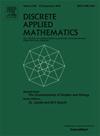Descent generating polynomials for (n−3)- and (n−4)-stack-sortable (pattern-avoiding) permutations
IF 1
3区 数学
Q3 MATHEMATICS, APPLIED
引用次数: 0
Abstract
In this paper, we find distribution of descents over - and -stack-sortable permutations in terms of Eulerian polynomials. Our results generalize the enumeration results by Claesson, Dukes, and Steingrímsson on - and -stack-sortable permutations. Moreover, we find distribution of descents on -, - and -stack-sortable permutations that avoid any given pattern of length 3, which extends known results in the literature on distribution of descents over pattern-avoiding 1- and 2-stack-sortable permutations. Our distribution results also give enumeration of -, - and -stack-sortable permutations avoiding any pattern of length 3. One of our conjectures links our work to stack-sorting with restricted stacks, and the other conjecture states that 213-avoiding permutations sortable with stacks are equinumerous with 321-avoiding permutations sortable with stacks for any .
下降生成(n−3)和(n−4)堆栈可排序(避免模式)排列的多项式
在本文中,我们用欧拉多项式找到了(n−3)-和(n−4)-堆栈可排序排列的下降分布。我们的结果推广了Claesson, Dukes和Steingrímsson关于(n−3)-和(n−4)-堆栈可排序排列的枚举结果。此外,我们发现了(n−2)-,(n−3)-和(n−4)-堆栈可排序排列上的下降分布,避免了任何长度为3的给定模式,这扩展了文献中关于避免模式的1-和2-堆栈可排序排列上下降分布的已知结果。我们的分布结果还给出了(n−2)-,(n−3)-和(n−4)-堆栈可排序排列的枚举,避免了任何长度为3的模式。我们的一个猜想将我们的工作与限制堆栈的堆栈排序联系起来,另一个猜想指出,对于任何t, t堆栈可排序的213-避免排列与t堆栈可排序的321-避免排列是等量的。
本文章由计算机程序翻译,如有差异,请以英文原文为准。
求助全文
约1分钟内获得全文
求助全文
来源期刊

Discrete Applied Mathematics
数学-应用数学
CiteScore
2.30
自引率
9.10%
发文量
422
审稿时长
4.5 months
期刊介绍:
The aim of Discrete Applied Mathematics is to bring together research papers in different areas of algorithmic and applicable discrete mathematics as well as applications of combinatorial mathematics to informatics and various areas of science and technology. Contributions presented to the journal can be research papers, short notes, surveys, and possibly research problems. The "Communications" section will be devoted to the fastest possible publication of recent research results that are checked and recommended for publication by a member of the Editorial Board. The journal will also publish a limited number of book announcements as well as proceedings of conferences. These proceedings will be fully refereed and adhere to the normal standards of the journal.
Potential authors are advised to view the journal and the open calls-for-papers of special issues before submitting their manuscripts. Only high-quality, original work that is within the scope of the journal or the targeted special issue will be considered.
 求助内容:
求助内容: 应助结果提醒方式:
应助结果提醒方式:


